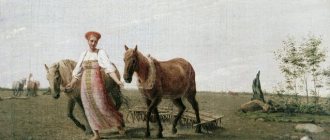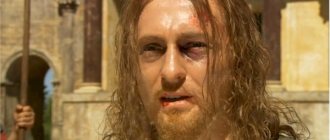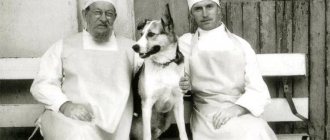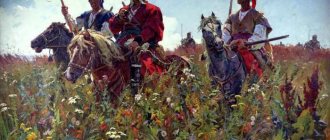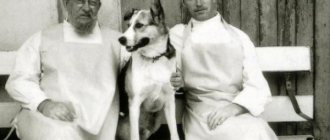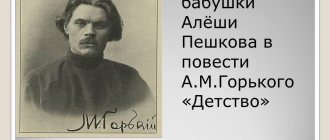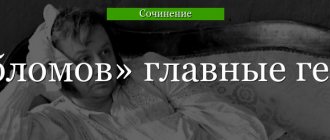Portrait: description of appearance, characteristics of speech and manners
When the reader meets the main character of the story, he is 53 years old. Ivan Severyanich Flyagin resembles a simple-minded and kind Russian hero, “grandfather Ilya Muromets in the beautiful painting by Vereshchagin and in the poem of Count A.K. Tolstoy.” He is huge, his face is dark, with a thick gray mustache curled upward like a hussar. The hair is wavy, thick, with graying, which gives it a leaden color. He is dressed in a novice cassock and a tall black cap.
Flyagin behaves with other people boldly, self-confidently, but without swagger, speaks in a pleasant bass voice, leisurely, softly. His speech is simple, smooth, he speaks interestingly and intelligibly, he is not offended by the objections of his listeners, but explains his point of view.
Life path
Ivan Flyagin was nicknamed “Golovan” because he was born with a very large head. He was a “prayerful son” - his mother begged him from God and died during childbirth. His father, Severyan Ivanovich, was a coachman, a serf of Count K., so the boy loved and understood horses from childhood. At the age of 11, he became a postilion (riding a horse in front of horses harnessed to a carriage). On the way, he accidentally became the culprit in the death of the monk. In a dream, Ivan saw this monk, and he predicted that he would have many trials, and when he completely died, he would become a monk, since he was the “promised son” (his mother promised that he would serve God). Then wanderings and trials began in Flyagin’s life:
The main character of the story “The Enchanted Wanderer,” having made many mistakes along his life’s path, comprehended his actions and embarked on the path of repentance. He feels like a “wanderer” doing the will of God. The hero is fascinated by life, and at the end of it he became fascinated by the idea of self-sacrifice in the name of saving Russia from the troubles that threaten it.
Character traits
The image of Ivan Flyagin absorbed many character traits of the Russian people. The story “The Enchanted Wanderer” shows the “story of the growth of the soul” of the main character. At the beginning of his life, he sometimes showed cruelty and committed rash acts, but gradually came to the path of repentance. Despite the seemingly simplicity and unpretentiousness, the image of Ivan Flyagin is complex and ambiguous. For example, he has spiritual deafness towards his unbaptized children, who were born while he was in captivity, but he fell in love with his little pupil when he served as a nanny.
Ivan Flyagin has the following character traits:
The image and characteristics of Ivan Flyagin in the story “The Enchanted Wanderer”
In the work, the image of the main character, although outwardly unpretentious and simple, is ambiguous and complex. The author, studying the deep layers of the Russian soul, seeks holiness in the actions of a sinner, shows an impatient lover of truth who makes many mistakes, but, suffering and comprehending what he has done, comes to the path of repentance and true faith.
Key words that reveal the image of Ivan Flyagin: a deeply religious person, a selfless and simple-minded nature, independence and openness, self-esteem, exceptional physical and spiritual strength, an expert in his field.
Analysis of Leskov's story The Enchanted Wanderer
The main character of the work is Ivan Severyanych Flyagin, whose life path is described by the writer in a story telling about his endless wanderings.
The structural composition of the story consists of twenty chapters, each of which represents an independent fragment of the life path of Ivan Flyagin, a small, logically designed story that has a semantic ending, thereby giving development to the storyline.
In depicting the key characters of the work, the writer uses some features in the form of contradictions in appearance, character and actions. The appearance of Flyagin, who became a monk at the end of his life, has a heroic physique, broad forms, tall stature, and the author calls the characteristic features of the hero his wisdom, the ability to think logically, but at the same time commit extremely stupid, reckless acts that entail irreparable consequences. Thus the writer emphasizes
In the image of the protagonist's beloved, the gypsy Grusha, the writer describes a girl with a passionate, impulsive nature, combined with a virtuous personality.
The key idea of the story, the author considers the interconnection of human life in the context of his relationship to his homeland and religious concepts, emphasized by the peculiarities of the Russian spiritual mentality and expressed in life’s disappointments, unfair actions, while not losing hope for a better future and persistent mysterious optimism.
In addition to this idea, the story touches on other diverse issues such as the influence of religion on a person’s destiny, the truth of love relationships, social inequality, education, the comparison of monasticism and worldly life, as well as the concept of justice.
In its focus, the story is an allusion to the Gospel scripture, telling the life of the prodigal son, in the image of Ivan Flyagin, who initially left God's destiny, plunging into the whirlpool of worldly life, but as a result returning to God in the form of accepting monastic rank.
Thus, the writer in the work reveals to the reader the image of the righteous, touching on the pressing human problems of our time.
Option 2
The main character of the work is Ivan Severyanych Flyagin, presented by the writer in the image of a simple man.
Ivan is described in the story as a huge man of about fifty with an open dark face, having an unusual shade of gray hair, folded into thick wavy hair, dressed in the cassock of a monastic novice.
A characteristic feature of Flyagin is his fascination with the mystery of life, the surrounding world, which he perceives as a miracle. Wandering around the world, Ivan feels every new shelter as an extraordinary event in his destiny.
Flyagin's wanderings around the world are determined by his thirst for knowledge of the world, and not so much by the frivolity and inconstancy of Ivan, relying on his own intuition and trusting the wisdom of life.
Flyagin adheres to his morals and faith in his actions, remaining both for himself and for those around him an honest person, not afraid to open the hidden corners of his soul to both random fellow travelers and God. He understands that he does not always do good deeds and in the future he will have to answer for all the sins of his long life. This realization begins to weigh heavily on Ivan, but his strength of spirit and will do not allow him to succumb to sad moods.
Ivan Flyagin has enormous physical natural strength, which becomes the reason for his actions, sometimes unsightly and unseemly, but not based on feelings of hatred, lies and personal gain, but, on the contrary, demonstrating the courage, bravery of the hero, and sometimes his simplicity and naivety. In some moments, Flyagin shows mercilessness and immediately becomes the kindest person, somewhere Ivan is cunning, and then expresses primitiveness. On the one hand, Flyagin can be impudent, and on the other hand, enthusiastically poetic. Often Flyagin is not able to give an account of the actions he commits. These character traits of the hero reflect the contradictory nature of his nature.
The writer portrays Ivan Flyagin as a man for whom the impossible does not exist; Ivan Severyanych is filled with spiritual strength, echoing unbridled optimism and invulnerability. Ivan constantly, regardless of circumstances, feels harmony with the world around him.
Using the example of Ivan Flyagin, the writer creates a new literary hero who personifies the collective image of the Russian national character, organically merging with the world of life, without fear of getting lost in it.
Narrating the wanderings of the hero of the story and his meetings, the author identifies Flyagin with the epic Russian hero, distinguished by his kind and simple-minded character, as well as extraordinary talent and possessing the amazing gift of feeling the joy of life and happiness from every day he lives.
Analysis 2
The travelers met on a water ship, one of them was a monk, and it was he who decided to tell his fellow travelers about his life. Using the example of this monk Ivan, the author shows the variability and instability of society, the relationships of people within it.
It is the monk who talks about where he grew up and what his fate was. The main character of the work is an ordinary peasant, he grew up on the count's estate and worked for him. He is so cheerful and reckless that you simply cannot stop him, he runs around frolicking and does all sorts of things. But one made him think and stayed with him until the end of his days.
Once he was riding a horse and did not have time to turn, he crashed into a monk, who died on the spot. Since then, it constantly comes to him in a dream and demands that the main character atone for his sins. Soon Ivan meets his first love, Grusha, a girl from a gypsy family.
But his love was not destined to be reciprocated; his beloved was in love with the count. The Count did not take the gypsy seriously; as a result of another quarrel, Grusha died because of unrequited love. Ivan was upset, did not know what to do and decided to go to war.
After he took part in several battles, he was awarded an award for bravery. Soon he was given the rank of officer, but Ivan does not want such a fate for himself; he tells everyone that he has a lot of sins.
Accordingly, in order to atone for these sins, the main character is going to become a monk and serve the Lord God. After Ivan became a monk, he received a little peace of mind and peace. But while talking with his neighbors on the boat, he tells them that he is ready to go to war.
The character of the main character is complex and multifaceted, constantly changing and uncertain, after some events others happen, the monk wants to change everything, but does not know how.
He simply does not have sufficient confidence in his abilities and confidence in his actions, so he constantly runs from one shore to another. The main character lacks seriousness and self-confidence.
But at the same time, being a hooligan in his youth, Ivan was able to suppress his bad character traits and become a minister of the church. He was able to put away his daring habits and wild lifestyle, this testifies to the strength of character of the main character.
Can Ivan Flyagin be called a righteous man?
Ivan himself considers himself a terrible sinner and repents for the lives he ruined. But the deaths he caused were without malicious intent: the monk died accidentally, due to his own negligence, the Tatar died in a fair fight, Grushenka was saved from a terrible fate at her request. Will repentance be given to the prince who crippled other people's destinies, to Grushenka's father who sold his daughter, to the Tatars who killed the missionaries?
Ivan is strong in his faith in moral principles, but he is not given Christian humility, and it is difficult to put up with injustice. He is fascinated by life, but having resisted temptations and endured the trials of fate, he finds peace in righteous faith and service. By atoning for his sins, he becomes righteous.
Option 3
The story “The Enchanted Wanderer” is one of the strangest, but at the same time fascinating works of classical prose of the 20th century.
Let's turn to the image of the main character. Ivan Severyanych Flyagin is a man with an exceptional destiny and an unusual worldview. For the unprepared reader, Flyagin’s adventures will become truly exotic. They grab you and don't let you go until the very last pages. Many people know that Leskov took the well-known Chichikov from Gogol’s “Dead Souls” as a prototype for his hero. However, unlike Chichikov, Flyagin, having gone through a huge number of tests, does not lose the kindness in his heart and the sincerity of his feelings.
The character's childish naivety is somewhat at odds with his powerful physique. And this attracts the reader, makes him develop sympathy for Flyagin. Of particular interest is Flyagin’s attitude towards his conscience - he coordinates all his affairs with it. Because of his conscience, Leskov’s hero often has to compromise with generally accepted morals and values. Flyagin has to choose the lesser of two evils. It is because of him that the monk dies, it is he who beats the Tatar prince to death with a whip. And it is he who pushes his beloved off the cliff. But Leskov claims that Flyagin is the best and honest actor, which, of course, can be argued with.
At some point, Flyagin finds himself in a monastery. He, in his own words, had absolutely nowhere to go. This is where thoughts about his homeland and people fall upon him. He becomes ready to “die” for ordinary people. But the hero sees only external enemies, resolutely not noticing internal enemies. But, at moments, something still awakens in him, and Flyagin begins to scold the nobles. But not angrily, but as if a father were scolding his capricious children, saying what to take from them!
Ultimately, he packs up and goes to war with the enemies of his land. He is ready to give his life, because how will his homeland manage without him? While smart, educated people with their progressive ideas are fighting in the state itself, someone must defend this very state!
Flyagin is one of those who did not receive an education, he does not understand a lot, he is a naive, hard-working person, a true son of his country. There are many of them these days, and that is why Flyagin is a collective image of a simple Russian person.
The search for truth and justice in life (based on the story “The Enchanted Wanderer” by N. S. Leskov)
at the same time, risking his life, he saves the life of his master.
The key word of the story - “fool”, which is a certain semantic anchor, reveals the almost childish naivety of the hero, when, in gratitude for the salvation, the count is ready to fulfill any request of the savior; after a long thought, he asks for an accordion. Therefore, the laughing count said: “Well, you really are a fool...” Surprised by the fugitive serf’s unreasonable desire to “show up,” the clerk later lamented: “You’re a fool, a fool: why should you show up?” The prince also expresses doubt in Flyagin’s mind: “I have the man is Ivan Golovan, from the regimental cones, he is not very smart, and the golden man is honest and zealous...” Gentleness, kindness and truthfulness, the complete absence of selfish calculations and looks like stupidity in the mercantile age and are the reason for many turns in the hero’s fate.
When Ivan Severyanovich served as a nanny, which was completely incongruous with his gender and physical appearance, he takes his first steps in mastering the world of someone else's soul. For the first time, the hero experiences compassion and affection, for the first time he deeply penetrates the feelings of the mother of the child entrusted to him: “I began to get used to her terribly, I loved that child.” This attachment determines the action: he understands the suffering of the mother, who is “torn in half” between the repairman and her daughter. And unwittingly finding himself involved in a complex human fate, he makes a decision not in his own favor, but in favor of the suffering person. Ivan Severyanovich Flyagin is a man of unpredictable human reactions. The hero’s feelings are nurtured through the test of affection for a defenseless child. There was also a painful ordeal of captivity, where an all-consuming feeling of longing for the Motherland developed, the realization of oneself as a Russian person came: “.. you wait until night, crawl quietly to the headquarters so that none of the filthy ones see you... you pray so much that... where the tears fell, in the morning you'll see grass." Holy Rus', to which the narrator strove, celebrates the return of the prodigal son in a unique way - with whips: “They were flogged by the police and brought to his estate,” the count “ordered... to flog the houses again.”
The test of female beauty causes in the hero not only pleasure, delight and passion, but something more - shock. The feeling that has arisen is too great to be reduced to earthly possession; it is comparable only to the pleasure of contemplating divine perfection, that saving beauty that reveals a special, highest spiritual value. The writer believes in the transformative power of goodness and beauty, echoing the conviction of F.M. Dostoevsky that “beauty will save the world.” The author discovers an amazing spiritual subtlety in a simple peasant and defends it with the same ardor and passion with which he defends the ability of a Russian person to comprehend the secrets of high art. Seeing the gentlemen’s offense in the fact that Grusha treats the man, Flyagin thinks: “Oh, you, the wolf will eat you! Is it really because you are richer than me that you have more feelings?..” Beauty and talent, according to the author, have a truly magical power of influence. Other people's money, which until recently Ivan Severyanich cared so much about and never forgot for a minute, suddenly acquires a different quality: it is now valued only
Popular topics today
This work tells about the terrible fate of one fighter named Andrei. The action takes place during the Great Patriotic War, in which the hero lost his entire family.
The work of Alexander Sergeevich Griboyedov “Woe from Wit” is based on a social conflict. This is the main conflict of the comedy taking place between Alexander Andreevich Chatsky and Moscow, “Famus” society.
The problem of honoring rank is the main problem of Russian society. This problem is not of a specific era. This problem has always been and still is. Many literary works are devoted to ridicule of ceremonial worship
The image of Stepan Astakhov, a Don Cossack, is one of the key ones in Mikhail Aleksandrovich Sholokhov’s work “Quiet Don”. He is the neighbor of the main character Grigory Melekhov and an involuntary witness of his entire life.
The work of Sergei Aleksandrovich Yesenin “Anna Snegina” describes the events that took place in Russia from 1917 to 1923. Due to the situation of civil heavy war and the ongoing revolution
Source
Retelling of the story “The Enchanted Wanderer” by N.S. Leskov.
Retelling plan
1. Meeting of travelers. Ivan Severyanych begins a story about his life. 2. Flyagin finds out his future. 3. He runs away from home and ends up as a nanny for the daughter of a gentleman. 4. Ivan Severyanych finds himself at a horse auction, and then in Ryn-Peski as a prisoner of the Tatars.
5. Release from captivity and return to hometown.
6. The art of handling horses helps the hero get a job with the prince.
7. Flyagin meets the gypsy Grushenka.
8. The prince’s fleeting love for Grushenka. He wants to get rid of the gypsy woman.
10. The hero's service in the army, in the address desk, in the theater.
11. The life of Ivan Severyanich in the monastery. 12. The hero discovers the gift of prophecy.
Retelling
On Lake Ladoga, on the way to the island of Valaam, several travelers meet on a ship. One of them, dressed in a novice cassock and looking like a “typical hero”, is Mr. Flyagin Ivan Severyanich. He gradually gets involved in the passengers' conversation about suicides and, at the request of his companions, begins a story about his life: having God's gift for taming horses, all his life he “died and could not die.”
Ivan Severyanych continues the story. He came from a family of servants of Count K. from the Oryol province. His “parent,” his coachman Severyan, Ivan’s “mother” died after childbirth because he “was born with an unusually large head,” for which he received the nickname Golovan. From his father and other coachmen, Flyagin “learned the secret of knowledge in animals”; from childhood he became addicted to horses. Soon he became so comfortable that he began to “show postilion mischief: to pull some guy he met across his shirt with a whip.” This mischief led to trouble: one day, returning from the city, he accidentally kills a monk who had fallen asleep on a cart with a blow of his whip. The next night the monk appears to him in a dream and reproaches him for taking his life without repentance. Then he reveals that Ivan is the son “promised to God.” “And here,” he says, is a sign for you that you will perish many times and will never perish until your real “destruction” comes, and then you will remember your mother’s promise for you and will go to the monks.” Soon Ivan and his owners go to Voronezh and on the way saves them from death in a terrible abyss, and falls into mercy.
Upon returning to the estate after some time, Golovan starts pigeons under the roof. Then he discovers that the owner’s cat is carrying the chicks, he catches her and chops off the tip of her tail. As punishment for this, he is severely flogged, and then sent to “the English garden for the path to beat pebbles with a hammer.” The last punishment “tormented” Golovan and he decides to commit suicide. He is saved from this fate by a gypsy who cuts the rope prepared for death and persuades Ivan to run away with him, taking the horses with him.
But, having sold the horses, they did not agree on the division of money and separated. Golovan gives the official his ruble and silver cross and receives a leave certificate (certificate) that he is a free man and sets off around the world. Soon, trying to get a job, he ends up with a gentleman, to whom he tells his story, and he begins to blackmail him: either he will tell everything to the authorities, or Golovan will go to serve as a “nanny” for his little daughter. This gentleman, a Pole, convinces Ivan with the phrase: “After all, you are a Russian person? The Russian man can handle everything.” Golovan has to agree. He knows nothing about the mother of a girl, an infant child, and does not know how to handle children. He has to feed her goat milk. Gradually, Ivan learns to care for the baby, even treat him. So he quietly becomes attached to the girl. One day, when he was walking with her by the river, a woman approached them, who turned out to be the girl’s mother. She begged Ivan Severyanych to give her the child, offered him money, but he was relentless and even got into a fight with the lady’s current husband, a lancer officer.
Suddenly Golovan sees the angry owner approaching, he feels sorry for the woman, he gives the child to the mother and runs away with them. In another city, an officer soon sends the passportless Golovan away, and he goes to the steppe, where he ends up at a Tatar horse auction. Khan Dzhangar sells his horses, and the Tatars set prices and fight for the horses: they sit opposite each other and whip each other with whips.
Essay Characteristics and image of Ivan Flyagin
The story was created in 1873 and initially had a different title. N. S. Leskov took the image of a man from the people and similar to Ilya Muromets.
The story tells about a good-natured and very kind person who adapts to any conditions and life situations. Leskov writes that Flyagin was born a serf and was supposed to become a servant of God. Even as a child, he often committed rash acts. He was often mistaken, but he always continued to love life, no matter what it had in store for him. He treats everything and everyone sincerely and, when doing something, always hopes that it is for the good. When he makes some mistakes, he sincerely repents and wants to correct them.
Since childhood, Ivan has a certain gift, which is that he is invulnerable to death. Even he himself says about himself that he died many times, but never died. Working for the count, he saves his family, almost dying himself. He has a lot of strength and energy that he cannot direct in the right direction. He is very fair, because even when the cat ate the chick, he cut off the cat's tail in order to punish him. For this, of course, he received punishment, but he was not upset, but accepted it humbly.
Flyagin could always and everywhere adapt to life, he lived with the Tatars, monks, wandered all over the world, but his soul always missed his native land. Every episode of his life is another bright and explosive adventure. Ivan is a very sinful person, he kills the monk by accident, then the gypsy Grusha, who herself asked him about it. He did this consciously and understood that he was depriving a person of life, but he really wanted to help the deceived girl. He felt sorry for her, and he took this sin upon himself. The monk was killed by accident, but over time Flyagin greatly reproaches himself for such a rash act of recklessness. Ivan dreamed of a dead monk and warned him that until he became a servant of the Lord, he would never die and find peace. Flyagin does not take this as a basis, but again sets off on a journey.
His life brings him to the Tatars, they treat him with respect, because he proved himself in battle. He lives very well, he has two wives and children, and it seems like he should be happy, but his nature as a people’s man pulls him to his native land. He wants to be useful to his people and wants to return home to his parents, whom he misses very much.
He tries to find his place among people and fails to find it every time. He changed his place and lifestyle so often that one could say he tried on many different masks.
Flyagin helps old people who really want their son not to be taken to war. He decides to go instead of him under his name and wants to die for his homeland. He doesn’t feel sorry for himself at all, he wants to help his people and protect them. So he served for fifteen whole years and rose to the rank of officer. He was greatly respected and valued, and his opinion was listened to a lot. Flyagin always acts according to his heart and adapts to circumstances. When he and the soldiers were ambushed in the Caucasus, Ivan survived, and the path was suggested to him by the same Grusha, who became his guardian angel after her death.
After long wanderings and adventures, Ivan decides to go to the monastery. He liked it there and despite having to sit in the cellar all summer, he found joy here too. After all, he will hear the church bell ringing. Flyagin never lost heart and never gave up. The monks helped him get rid of the demons living inside him. Ivan finds peace of mind and humility. He struggled with demons for a very long time.
Flyagin even predicted a war and really wanted to get to it in order to once again come to the defense of great Rus' and its people. At the monastery they tried to help him figure out whether it was providence or just madness. So he was alone with himself for a whole winter.
Ivan sets off on the ship on another exciting journey and believes that everything will work out for him
